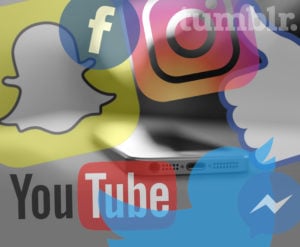![]()

Social media links to depression according to a new study.
A recent study published in the American Journal of Preventive Medicine, found a significant correlative trend between the amount of time spent on social media and depression.
The study, which gathered statistics from 1,787 young adults aged 19-32, found that social media use “was significantly associated with increased depression.” The members were recruited in the fall of 2014 and represent 97 percent of the U.S. population.
They studied 11 social media platotforms including Facebook, Twitter, Google+, YouTube, LinkedIn, Instagram, Pinterest, Tumblr, Vine, Snapchat, and Reddit.
The article notes that special care and direction must be given toward addressing social media related grievances. According to the study, “Given the proliferation of [social media], identifying the mechanisms and direction of this association is critical for informing interventions that address [social media] use and depression.”
The article, however, notes that it cannot give the direct reason for this corresponding depression. Gary Oliver, executive director for the Center for Healthy Relationships at John Brown University, said that social media is only a pale substitute for real relationships, which is what people really want. “Part of the problem with social media, which has a lot of positives, is that we’re raising a bunch of young people who don’t know how to have relationships, and a virtual relationship is not a relationship,” he said.
“The main thing is not asking how much social media is too much,’ but how much of our relationships are enough,” Oliver said in response to posing limits on social media usage. Oliver said that direct communication would help to fight depression. “It matters if I’m in small groups, if I have friends I do things with or if I have folks to think out loud with.”
Jay Bruce, associate professor of philosophy at JBU, said he barely uses social media anymore, and prefers to maintain his relationships in a more direct manner. “I don’t want to do this stuff generally because it’s a waste of time. I have friends. Real ones. I talk to them. Really, I pick up the phone and call them, or send an email crafted just for that person. I want to know what people are doing because I know them, not because I’ve seen a Facebook update or whatever,” Bruce said.
Bruce took a condemnatory view of social media, saying that social media, largely, appealed to baser human instincts as opposed to healthy motivators.
“Social media nurtures and fosters vices destructive to our wellbeing. If we have more friends, followers, or whatever, then we turn to pride; if we don’t, to despair. Envy? Social media promotes excessive reflection on our relative standing to others in terms of financial success, beauty, etc.,” Bruce said.
Oliver said that real relationships are the key to pushing against social media’s surface level tendencies. “We’re wired for relationships, and to have personal relationships,” Oliver said.




